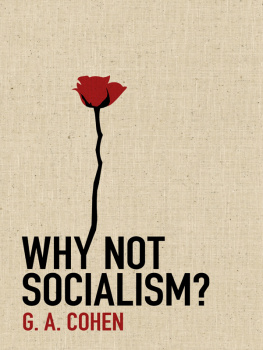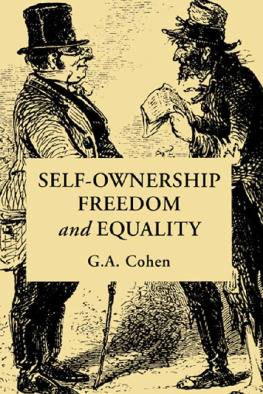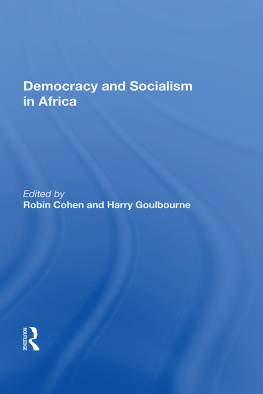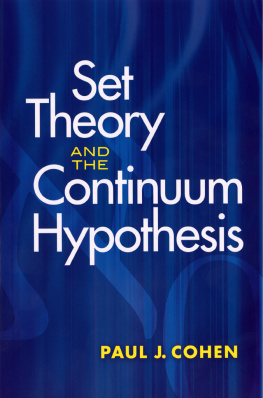G. A. Cohen - Why Not Socialism?
Here you can read online G. A. Cohen - Why Not Socialism? full text of the book (entire story) in english for free. Download pdf and epub, get meaning, cover and reviews about this ebook. year: 2013, publisher: Princeton University Press, genre: Politics. Description of the work, (preface) as well as reviews are available. Best literature library LitArk.com created for fans of good reading and offers a wide selection of genres:
Romance novel
Science fiction
Adventure
Detective
Science
History
Home and family
Prose
Art
Politics
Computer
Non-fiction
Religion
Business
Children
Humor
Choose a favorite category and find really read worthwhile books. Enjoy immersion in the world of imagination, feel the emotions of the characters or learn something new for yourself, make an fascinating discovery.
Why Not Socialism?: summary, description and annotation
We offer to read an annotation, description, summary or preface (depends on what the author of the book "Why Not Socialism?" wrote himself). If you haven't found the necessary information about the book — write in the comments, we will try to find it.
Why Not Socialism? — read online for free the complete book (whole text) full work
Below is the text of the book, divided by pages. System saving the place of the last page read, allows you to conveniently read the book "Why Not Socialism?" online for free, without having to search again every time where you left off. Put a bookmark, and you can go to the page where you finished reading at any time.
Font size:
Interval:
Bookmark:

WHY NOT SOCIALISM?
Copyright 2009 by Princeton University Press
Published by Princeton University Press, 41 William Street, Princeton, New Jersey 08540
In the United Kingdom: Princeton University Press,
6 Oxford Street,
Woodstock, Oxfordshire OX20 1TW
All Rights Reserved
Library of Congress Cataloging-in-Publication Data
Cohen, G. A. (Gerald Allan), 1941
Why not socialism? / G.A. Cohen.
p. cm.
ISBN 978-0-691-14361-3 (hardcover : alk. paper)
1. Socialism. I. Title.
HX73.C649 2009
335dc22 2009007472
British Library Cataloging-in-Publication Data is available
This book has been composed in Palatino
Printed on acid-free paper.
press.princeton.edu
Printed in the United States of America
10 9 8 7 6 5 4 3 2 1
WHY NOT SOCIALISM?
THE QUESTION that forms the title of this short book is not intended rhetorically. I begin by presenting what I believe to be a compelling preliminary case for socialism, and I then ask why that case might be thought to be merely preliminary, why, that is, it might, in the end, be defeated: I try to see how well the preliminary case stacks up on further reflection.
To summarize more specifically: In is a short coda.
I
THE CAMPING TRIP
You and I and a whole bunch of other people go on a camping trip. There is no hierarchy among us; our common aim is that each of us should have a good time, doing, so far as possible, the things that he or she likes best (some of those things we do together; others we do separately). We have facilities with which to carry out our enterprise: we have, for example, pots and pans, oil, coffee, fishing rods, canoes, a soccer ball, decks of cards, and so forth. And, as is usual on camping trips, we avail ourselves of those facilities collectively: even if they are privately owned things, they are under collective control for the duration of the trip, and we have shared understandings about who is going to use them when, and under what circumstances, and why. Somebody fishes, somebody else prepares the food, and another person cooks it. People who hate cooking but enjoy washing up may do all the washing up, and so on. There are plenty of differences, but our mutual understandings, and the spirit of the enterprise, ensure that there are no inequalities to which anyone could mount a principled objection.
It is commonly true on camping trips, and, for that matter, in many other nonmassive contexts, that people cooperate within a common concern that, so far as is possible, everybody has a roughly similar opportunity to flourish, and also to relax, on condition that she contributes, appropriately to her capacity, to the flourishing and relaxing of others. In these contexts most people, even most antiegalitarians, accept, indeed, take for granted, norms of equality and reciprocity. So deeply do most people take those norms for granted that no one on such trips questions them: to question them would contradict the spirit of the trip.
You could imagine a camping trip where everybody asserts her rights over the pieces of equipment, and the talents, that she brings, and where bargaining proceeds with respect to who is going to pay what to whom to be allowed, for example, to use a knife to peel the potatoes, and how much he is going to charge others for those now-peeled potatoes that he bought in an unpeeled condition from another camper, and so on. You could base a camping trip on the principles of market exchange and strictly private ownership of the required facilities.
Now, most people would hate that. Most people would be more drawn to the first kind of camping trip than to the second, primarily on grounds of fellowship, but also, be it noted, on grounds of efficiency. (I have in mind the inordinate transaction costs that would attend a market-style camping trip. Too much time would be spent bargaining, and looking over ones shoulder for more lucrative possibilities.) And this means that most people are drawn to the socialist ideal, at least in certain restricted settings.
To reinforce this point, here are some conjectures about how most people would react in various imaginable camping scenarios:
a. Harry loves fishing, and Harry is very good at fishing. Consequently, he catches, and provides, more fish than others do. Harry says: Its unfair, how were running things. I should have better fish when we dine. I should have only perch, not the mix of perch and catfish that weve all been having. But his fellow campers say: Oh, for heavens sake, Harry, dont be such a shmuck. You sweat and strain no more than the rest of us do. So, youre very good at fishing. We dont begrudge you that special endowment, which is, quite properly, a source of satisfaction to you, but why should we reward your good fortune?
b. Following a three-hour time-off-for-personal-exploration period, an excited Sylvia returns to the campsite and announces: Ive stumbled upon a huge apple tree, full of perfect apples. Great, others exclaim, now we can all have applesauce, and apple pie, and apple strudel! Provided, of course, so Sylvia rejoins, that you reduce my labor burden, and/or furnish me with more room in the tent, and/or with more bacon at breakfast. Her claim to (a kind of) ownership of the tree revolts the others.
c. The trippers are walking along a bridle path on which they discover a cache of nuts that some squirrel has abandoned. Only Leslie, who has been endowed from birth with many knacks and talents, knows how to crack them, but she wants to charge for sharing that information. The campers see no important difference between her demand and Sylvias.
d. Morgan recognizes the campsite. Hey, this is where my father camped thirty years ago. This is where he dug a special little pond on the other side of that hill, and stocked it with specially good fish. Dad knew I might come camping here one day, and he did all that so that I could eat better when Im here. Great. Now I can have better food than you guys have. The rest frown, or smile, at Morgans greed.
Of course, not everybody likes camping trips. I do not myself enjoy them much, because Im not outdoorsy, or, at any rate, Im not outdoorsy overnight-without-a-mattress-wise. Theres a limit to the outdoorsiness to which some academics can be expected to submit: Id rather have my socialism in the warmth of All Souls College than in the wet of the Catskills, and I love modern plumbing. But the question Im asking is not: wouldnt you like to go on a camping trip? but: isnt this, the socialist way, with collective property and planned mutual giving, rather obviously the best way to run a camping trip, whether or not you actually like camping?
The circumstances of the camping trip are multiply special: many features distinguish it from the circumstances of life in a modern society. One may therefore not infer, from the fact that camping trips of the sort that I have described are feasible and desirable, that society-wide socialism is equally feasible and equally desirable. There are too many major differences between the contexts for that inference to carry any conviction. What we urgently need to know is precisely what are the differences that matter, and how can socialists address them? Because of its contrasts with life in the large, the camping trip model serves well as a reference point for purported demonstrations that socialism across society is not feasible and/or desirable, since it seems eminently feasible and desirable on the trip.
II
THE PRINCIPLES REALIZED ON THE CAMPING TRIP
Two principles are realized on the camping trip, an egalitarian principle, and a principle of community. The community principle constrains the operation of the egalitarian principle by forbidding certain inequalities that the egalitarian principle permits. (The egalitarian principle in question is, as I shall explain, one of radical equality of opportunity: it is therefore consistent with certain inequalities of outcome.)
Next pageFont size:
Interval:
Bookmark:
Similar books «Why Not Socialism?»
Look at similar books to Why Not Socialism?. We have selected literature similar in name and meaning in the hope of providing readers with more options to find new, interesting, not yet read works.
Discussion, reviews of the book Why Not Socialism? and just readers' own opinions. Leave your comments, write what you think about the work, its meaning or the main characters. Specify what exactly you liked and what you didn't like, and why you think so.














